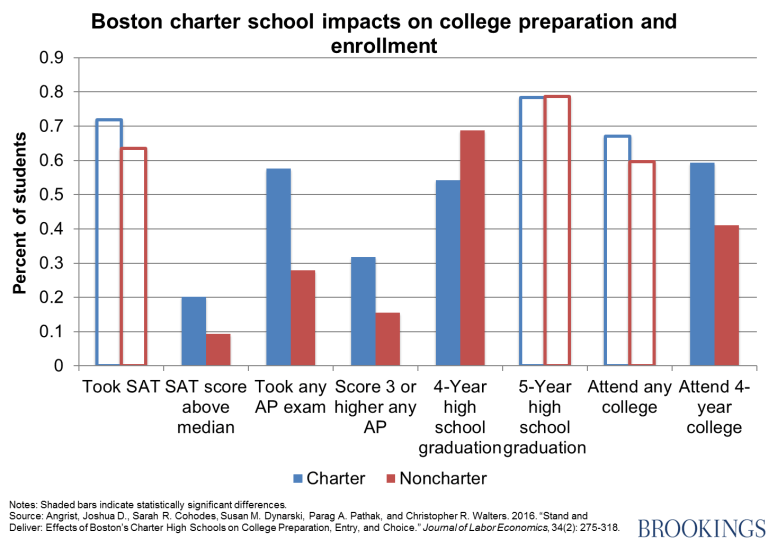Will the evidence on school choice ever change the politics? Right now, Massachusetts is putting that question to the test.
Nationally and in Florida, the evidence on charter schools is mostly mixed. Studies show they generally raise student’s test scores at about the same rates as traditional public schools, though they do it with less money. Research looking at how well charter school graduates do later in life is also hardly clear-cut.
But in Massachusetts, it’s a different story. Studies have found Boston charters are more effective than traditional schools at raising student test scores by a wide margin. A new study published by Brookings Institution shows charter school students in Boston do better than their peers in traditional schools by a wide range of measures, and are more likely to make it to college.
The urban results don’t carry into the suburbs and rural areas of Massachusetts, where charter schools don’t perform as well. But right now, voters are considering a referendum to raise a cap on the number of charter schools in the state. And the Brookings authors (Sarah Cohodes of Columbia Teachers College and Susan Dynarski of the University of Michigan) note that the cap does not currently limit charter growth in rural and suburban areas. In other words:
Massachusetts’ charter cap currently prevents expansion in precisely the urban areas where charter schools are doing their best work. Lifting the cap will allow more students to benefit from charter schools that are improving test scores, college preparation, and college attendance.
This, they write, means the question about the charter school cap is a rarity: “We have exactly the research we need to judge whether charter schools should be permitted to expand in Massachusetts.”
Jonathan Chait of New York Magazine calls the vote to raise Massachusetts’ charter school cap “one of the most important tests of social justice and economic mobility of any election in America this fall.”
But it’s also a crucial test of whether evidence matters in the politics of education reform. The answer to the question of whether school choice “works” is so often in the eye of the beholder. What happens when the data clearly tilts in one direction?
Social scientists like Jonathan Haidt have shown that people don’t make political decisions based on reason. They’re driven by gut-level intuitions and tribal allegiances.
The campaign against Massachusetts charters, both on the ground and in print, seems to offer a case in point.
Esquire writer and Massachusetts native Charles Pierce dismisses the evidence and argues philanthropists who are giving away the billions they made from big-box stores and financial information terminals are somehow looking to profit from the expansion of charter schools.
Call me crazy, but I don’t think Michael Bloomberg and the Walton family give a rat’s ass about educating children in Roxbury or Mattapan. I think they are running for-profit businesses that want to increase their profits and, in Massachusetts, they see a chance to make themselves more money, the way they have in Ohio, Wisconsin, Michigan, Florida, Arizona, and all those other places where education is considered an industry and children, essentially products.
What business? What profits? He doesn’t say. He simply dismisses out of hand the possibility that their donation to the education-reform cause springs from conviction. If Pierce believes Michael Bloomberg’s donations are by definition self-interested, he should also explain not only how he believes he will turn his donations to charter schools in Massachusetts into profit, but also how Bloomberg’s donations to gun control, same-sex marriage, and the environment will somehow line his pockets.
So far, it doesn’t look like the evidence has prompted politicians or political columnists to step beyond their existing tribal loyalties. In a few weeks, we’ll find out whether the same is true for voters.



